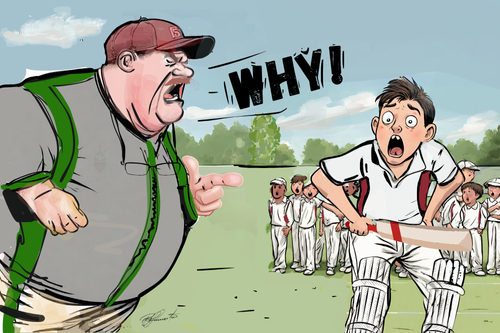“Dude, what are you up to out there? Hold onto the ball!” exclaimed an animated dad.
“I clearly said take the shot!” bellowed the coach at the puzzled young lad, who, instead of following the orders, calmly passed the ball to his teammate.
“He’s a bit lost isn’t he, doesn’t know what he is doing?” remarked a third parent, shaking his head as the promising attack petered out, and the ball went to the opposition.
Three adults with three all-too-familiar phrases we hear echoing from the side-lines of our hockey, soccer, rugby or basketball games nearly every weekend. If it’s cricket you can swap “shot” with “run,” or a litany of other words of advice. What has just happened?
Let’s dive in 👇
A common thread among many coaches and parents on the side-lines is their tendency to micromanage performance, quick to judge on what would have been the optimal decision to make at any given moment of the match. Although they are all giving different advice, they all share something in common:
EVERY SINGLE ONE OF THEM SAW THE PLAY FROM A COMPLETELY DIFFERENT GALAXY THAN THE ATHLETE!
Yep, they didn’t witness the ball seam off the pitch through the batter’s eyes or the opposition’s side-step through the eyes of the rugby player. They viewed it from an entirely different vantage point, miles away, and most importantly without an opponent hot on their heels. Despite this, they had the confidence to tell the athlete the “correct” decision, even though the athlete—the one learning—was in a far better position to make that call. They stole the reps, made the athlete recoil, got a bit confrontational and left the athlete as confused as a chameleon on a Smarties box.
Often when asked “what is your least favourite moment in sports” many reply with a sad answer: the ride home after the game or the coaches post-match analysis. It never ceases to amaze how a conversation off the field can unleash such havoc, but when you really ponder it, the toxicity of the post-game chat or car ride starts to make perfect sense. Emotions are flying high—disappointment, frustration, and exhaustion are at their peak for both player, parent and coach. Yet, in this prime moment of chaos, some may opt to embark on a journey of criticism, reprimanding their athlete for a less-than-perfect game, and throwing shade at everyone from teammates to coaches and even opponents. Could any moment be less teachable? The ride home: where well-intentioned teaching meets an emotional traffic jam! 🚦🚚🚜🚛🚚🚐🚓🚙
But it needn’t have to be this way! Using just two words the entire tone of the conversation can be changed into a positive experience and it will help us peer through their lens on the world.
Instead of hitting the athlete with a “Why didn’t you pass?” or a “Why didn’t you shoot?” or “Why didn’t you take two runs?” There is another approach that just might change the conversation into a constructive one. And here are those two magic words:
“I’M CURIOUS…” It’s that simple.
“I’m curious what you saw on that play because it looked like you had an open shot.”
“I’m curious why you didn’t take on that player; it seemed like a 1v1 situation.”
“I’m curious when you were defending against their spinner if you saw any other scoring options?”
By starting our sentences with “I’m curious,” an interesting transformation takes place:
- Our players get the opportunity not to defend why they took the action they did, but to explain what they saw and it gives them the opportunity to own their decisions.
- It also shows we are genuinely interested in them, in their point of view, in the decisions they made and in getting their side of the story. Opening that form of questioning can help us see things we may have missed, as truth be told, we weren’t in their boots! We don’t know what they saw whilst under pressure or what they didn’t see because we were most likely watching in a different spot, at a different angle, and we have a different view on what success would have looked like.
- We create a two-way conversation and not a lecture. You are curious and not challenging them.
We might be amazed by how players, will comment that they saw exactly what we saw but then go on to explain that a defender blocked a pass or that they believed a teammate was making a run that we didn’t notice. This approach allows us to coach while empowering them to own their decisions and consider alternative options. It lets us see what they’ve learned and what they’re observing. It also helps us to realise that many of our players do grasp the big picture but are coming up with different solutions to the challenges the game presents.
Be very intentional about the words you use with your athletes because you never know which ones will change the course of their lives
So as we look forward to future matches and if you decide to discuss the game afterwards, why not challenge yourself as both a coach and a parent to kick off your sentences with “I’m curious” and see what unfolds. Start with curiosity, without judgment, and see what you can learn too.






